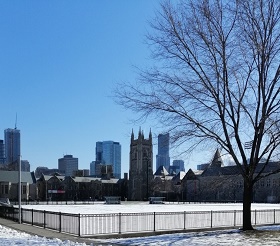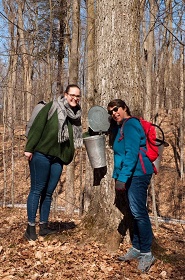Faculty of Arts - Canada, Toronto

I am a student from Germany, finishing my master’s degree in Multilingualism (Applied Linguistics) at the Campus Fryslân in Leeuwarden. This programme perfectly builds on my bachelor’s degree in European Studies, with a major in English linguistics and a minor in sociology. Already in my undergraduate studies, the experience which I treasured the most was my study abroad in Wales, UK. Thus, when one of our lecturers, Dr Nanna Hilton, informed us about an opportunity to get involved in a research project in Toronto for a placement, I immediately was interested. After a Skype interview with the leading researcher, Dr Naomi Nagy I was admitted as an international visiting graduate student at the University of Toronto for a research internship within the HLVC project.
The Heritage Language Variation and Change project explores the usage and change of several non-official languages spoken in Toronto, Canada. This research project is unique in its methodology, size and content as it overcomes monolingual traditions in variationist research, collects data across three generations of up to ten languages in a city which is one of the most diverse, multilingual and multicultural places in the world. My work for the HLVC is divided into 3 projects: exploring language attitudes of Russian heritage speakers, developing a new sociolinguistics assignment for undergrad courses, and providing advice for a suitable online language archive for the HLVC corpus.

The first, and overall biggest, project I participated in was the analysis of the Russian-speaking participants’ language attitudes. Originally, I wanted to collect data and conduct interviews myself but because of the Corona crisis and my early return to the Netherlands, I could not collect any data myself and had to use the existing corpus data. Nevertheless, my research resulted in very interesting findings. the 35 participants overall showed very strong opinions about their heritage language. I could identify 8 main themes: experiences surrounding learning or teaching Russian, their admiration of the language, the importance to pass it on, their awareness for language change, their concerns about the loss of Russian in Toronto, the importance to speak ‘proper’ Russian, ways to preserve the language, and lastly Russian as part of their identity and/or culture. All these comments turned out to be neutral or positive by the majority. Only 17% of analysed comments were negative. This, however, is only a fraction of my findings, but they will be explained in detail in thesis.
These eye-opening results are the basis for the second project of my internship where I designed an assignment for undergrad courses. For this, I documented all the steps leading to my findings in a way I could transfer these to specific instructions for undergraduate students to replicate my work on the Russian corpus and maybe other languages within the HLVC project in the future. With a template structured around learning objectives, necessary materials, instructions, the students’ tasks, output, and grading rubric items, I developed an extensive document explaining each stage of the assignment and provided possible outcomes with screenshots of my own work. This document will be used by Naomi in future sociolinguistic classes.

For the last project, I researched on existing online language archives, reached out to some of them, together with my supervisor, and discussed the possibilities to deposit the large HLVC corpus with one of them. The aim is to have the data in a more accessible archive to make it available for a larger group of researches, students as well as future contributors. We are still in contact with The Language Archive from the Max Planck Institute for Psycholinguistics in Nijmegen, which seems to be a great archive for the corpus. The process has been slowed down by the current circumstances, but if it works out, I helped bringing the HLVC to the Netherlands.
Overall, this internship has been a great experience despite the development regarding Covid19. I was, of course, very sad to return to the Netherlands early and not being able to explore Toronto as I planned to – however, I still met a lot of people and I enjoyed my time at the University of Toronto very much. I was able to network and learn a lot about how researching within a funded project works. I will take this knowledge with me when I apply for PhD positions and plan out my own research project. I am very grateful that the financial support by the GUF has made this possible. Moreover, I felt well taken care of with members of the board reaching out to me during this time and making sure I was okay.

